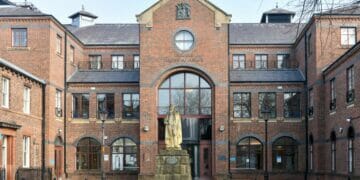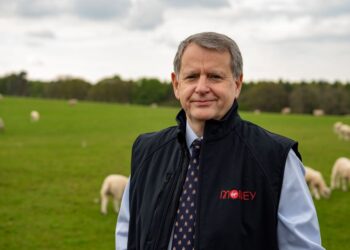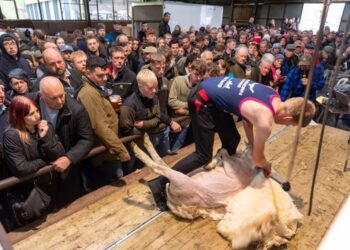
Farming comes in all sorts of forms. I have to confess that I am not really a farmer who is excited about growing arable.
I don’t have green fingers at all and I am not a lover of tractors.
As you know, I believe in doing the things that make you happy and you love, hence I am a livestock farmer.
That’s not saying I don’t appreciate the work of all our arable farmers.
They provide our food, and actually my sheep are happily chomping their way through a field of swedes a local farmer has grown for me.
However, there is one form of non-livestock farming that totally excites me and fills me with joy.
What, you make ask? Well it’s Christmas tree farming.
Christmas is a big thing in my house. It is connected to so many happy memories and traditions and one of the main ones is going to buy our Christmas tree.
Every year as a whole family we toddle off to Strawberry Hill Farm, just outside Penrith, and I think we emotionally traumatise the man there as we select the trees that are perfect for our family.
We take them home and across that day we all decorate them, drinking prosecco and eating good food.
As I write I can literally smell my tree and that smell brings a flood of amazing memories. I love that every single year our tree is slightly different, and we decorate it differently to work with its shape and size.
This year, I was challenged to really think about the environmental impact of buying trees and whether we should just buy a fake one and reuse it.
The word “fake” kind of ruins the experience for me, but at the same time I don’t want to be damaging our planet for the sake of my Christmas traditions.
After some research and talking with the Christmas Tree Growers Association, I discovered that in this country about seven million real Christmas tree are sold each year. That is seven million trees that have been producing oxygen and reducing the CO2 level in the air.
That threw me into despair — how could cutting that many trees down ever be a good thing? But as with all things environmental, there is always more to it that what initially meets the eye.
On further investigation, the Carbon Trust helped reduce my fear. They report that a real tree has a much lower carbon footprint than a fake plastic one, especially when it is disposed of thoughtfully.
A natural two-metre Christmas tree without roots, disposed of into landfill generates around 16kg of CO2.
If that tree is burnt, planted or chipped, it will have a carbon footprint of around 3.5kg — an impressive four-and-a-half times less.
There is still the argument that a plastic one still has less impact because it is reused. Well let’s look at that for a minute.
A two-metre fake Christmas tree made from plastic has a carbon footprint of around 40kg of CO2, which is over 10 times greater than that of a real tree, disposed of properly.
That means I would have to use a fake tree for over 10 years before its environmental impact would be equal to that of my real trees I have chipped — assuming the fake one even lasted that long.
Now let’s think wider, about the habitat the trees come from.
Most trees will have grown for 10-12 years before they are cut and will have provided homes for animals during that time.
This is a big plus for me. I love to see the birds outside and this year I have made my outdoor Christmas tree into a huge bird feeder where all the decorations are edible to birds.
Check out my social media to see the pics.
Now I don’t want to be destroying habitats so this is where it’s important where we get our trees from.
By buying a British grown tree from a local grower registered with the British Christmas Tree Growers Association, we are buying from farmers who are farming their trees sustainably and responsibly, replanting as they take out and protecting habitats.
We are also supporting small family-run businesses, from people who are part of our own community.
So, from the starting point of being challenged to go fake, I can honestly say I am playing my part for the environment this year and keeping it real, keeping it local and keeping it from a recognised grower.
As I end, I final word of warning to Strawberry Hill Farm.
The Jackson family are on their way and will see you soon for socially distanced Christmas tree buying. We can’t wait!































